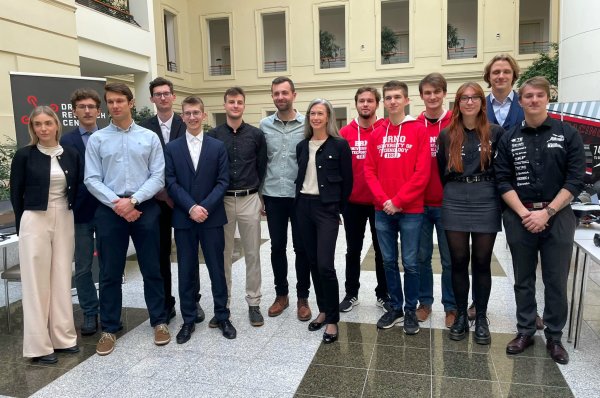Canada and the Czech Republic are strengthening their ties in trade, technology and innovation. In an era of global uncertainty, transatlantic partnerships are more valuable than ever — as highlighted in our conversation with Emily McLaughlin, Canada’s Ambassador to the Czech Republic.
Healthy and robust relations with promising potential
How would you describe the current state of trade relations between our countries?
From my perspective, they’re excellent and multifaceted. We’re working together across multiple sectors and scales, from SMEs to large multinational companies. In 2024, our bilateral trade reached 1.3 billion Canadian dollars. Canada's exports to Czechia include a broad mix: aircraft, machinery, electronic components, beauty products and even pet food. Czech exports to Canada are equally diverse - railway ties, industrial machinery and, of course, beer.
We also have a strong investment relationship. Canadian companies operating in Czechia, such as Magna, CGI, Bombardier Recreational Products and Fairfax Financial (Colonnade Insurance), collectively employ around 10,000 people, primarily in manufacturing and services. On the other side, Czech companies like Colt CZ and GZ Media are investors in Canada.
Overall, it's a healthy and robust trade relationship with promising potential for growth. One exciting recent development is the resumption of Air Canada direct flights between Toronto and Prague this June - a big step toward strengthening both business and people-to-people connections.
New technologies, energy transition, leveraging resources
In which sectors do you see the greatest potential for Czech SMEs looking to expand into the Canadian market?
Canada and Czechia face similar economic challenges and opportunities - digital transformation, energy transition, climate change mitigation and a shift toward high-tech industries. Canada has strong capabilities in these areas, but there’s always room for more innovation and collaboration. I’ve seen interesting developments in the Czech tech space, particularly around AI.
Canada is also a resource-rich country - there's a lot of talk these days on critical minerals, oil and gas, potash and uranium - so there are opportunities for Czech firms offering technologies or services in those domains.
What tools and support does Canada offer them?
I have worked in the past with SMEs, so I understand that for them, market entry can be daunting, as one of their barriers is having the resources to look into new markets. That’s where we come in. At the embassy - and at Canadian missions worldwide - we offer hands-on support for Canadian businesses who are looking to explore new markets. The Czech Embassy in Ottawa and the Consulate General in Toronto also provide similar support to Czech businesses.
We also help Czech businesses looking to invest in Canada. Our country is a multi-jurisdictional federation with two official languages, the federal government level, provinces and big cities who have their own investment attraction programmes – it can be complex. We help companies navigate that landscape, help them understand what programmes exist, where innovation clusters are located or where there are supports in place for attracting specific industries.

From a recent visit to VUT Brno
CETA doesn’t do business for you, but it clears the path
How do you assess the impact of the CETA agreement on trade between the Czech Republic and Canada so far? What specific benefits can Czech SMEs continue to gain from this agreement?
CETA has had a significant and positive impact. Czechia was a strong supporter from the start - the Czech government held the EU presidency when negotiations began and was among the first to ratify the agreement in 2017. Since then, bilateral trade between our countries has grown by 34%, and Canadian exports to Czechia have more than doubled between 2017 and 2022. CETA has helped open up opportunities beyond Canada’s traditional trading partners in Europe - like France, Germany, or the UK - and encouraged businesses to explore Central and Eastern Europe.
The agreement removes tariff and non-tariff barriers. It doesn’t do business for you, but it clears the path, making it easier for companies to forge connections and trade. Particularly in today’s uncertain global environment, stable and predictable trade frameworks like CETA are more valuable than ever, particularly when it comes to market diversification.
Innovation bridges: From research labs to real-world solutions
Canada is known as a leader in innovation and technological development, including the field of hydrogen technologies. In which areas can Czech companies and startups establish cooperation with Canadian partners?
Hydrogen is definitely a hot topic, and we’re seeing interest in building trade and partnerships in that area as Canada is a global leader in hydrogen and fuel cells. But there’s much more to highlight.
Canada has established five Global Innovation Clusters in areas such as digital tech, advanced manufacturing, AI, plant-based proteins and ocean technologies. These clusters bring together companies, researchers and investors, forming ecosystems for innovation. They actively seek international collaboration - which presents a great opportunity for Czech companies working in these fields. Given the Czech Republic’s strengths in agriculture, AI or advanced manufacturing, there’s potential across clusters.
I should also mention that in 2024, Canada joined Pillar II of Horizon Europe as an associated country, opening further opportunities for collaboration between Canadian and Czech researchers and tech innovators.
Hands-on experience gives you the best insight
In February, you visited the Brno University of Technology, where researchers and students presented the results of their technological research activities. What did you find the most interesting? What impression did you take away from the meeting?
It was fantastic. I spent about an hour and a half there but I could have stayed all day. The university was extremely welcoming, and I really appreciated the opportunity to meet with their leadership. But the highlight was definitely the student demonstrations.
They were energetic, hands-on and truly passionate about their work. I tried flying a drone simulator (and crashed it!), and then drove a race car simulator (crashed that too). But beyond the fun, what really stood out was how these students are working on real-world solutions to pressing global challenges. It’s always energizing and refreshing to meet young people who are not just dreaming, but creating something special. It gives me hope.

The Ambassador tried out formula racing and drone piloting at VUT
Brno University of Technology has an ongoing collaboration with Canadian research institutions. Can you briefly describe this cooperation and mention other successful examples of Czech-Canadian partnerships in this field?
Yes. Brno University of Technology has a formal agreement with the Waterloo Institute for Nanotechnology (WIN), Canada’s largest nanotech research centre, founded in 2012 with support from Mike Lazaridis, co-founder of BlackBerry. This collaboration has led to a joint seed funding programme - a valuable model for kickstarting cross-nation or multi-institution research initiatives. Getting early-stage funding is often a major hurdle for entrepreneurs and researchers, and programmes like this help move great ideas into development.
The Technical University of Liberec also signed an MoU with WIN and with the University of Waterloo’s Department of Chemical Engineering in 2024. It’s early days, but very promising. At the embassy, we try to map Canadian institutions and facilitate partnerships like these, particularly for Czech universities looking to expand their global footprint.
Strong roots, shared futures
How do you perceive the role of transatlantic cooperation in light of the current turbulent geopolitical situation?
We’re proud to be your transatlantic partner. Canada has deep roots in Europe - our founding nations, our sacrifices in both world wars, our role as a founding NATO member. After 1968, we welcomed many Czech dissidents who built strong communities in Canada.
These historic ties matter and we value them very much. And today’s turbulence only reinforces the importance of market diversification and trusted, stable and predictable partners. Our role at the embassy is to support that - helping companies explore new markets and build resilience. There are teams on both sides - Czech and Canadian - committed to helping businesses grow. Because the growth of trade and investment creates jobs, which in turn creates prosperity for all.
What goals did you set when you began your mission in Prague? And what are you most proud of so far?
I arrived into a strong and active trade relationship - my priority was to keep that momentum going. I have a small but mighty team here working closely with companies to understand sectors, find partners and identify opportunities. My role is to support them: visiting businesses, listening to their goals and challenges, and speaking publicly about the many possibilities between Canada and Czechia. Looking ahead, there’s always more to do. We’re particularly focused on helping companies diversify and grow. And I’m truly honoured to be in this role, supporting Canadian and Czech companies as they build lasting partnerships.
Ambassador Emily McLaughlin was interviewed by Daniel Libertin
Photo credits: Embassy of Canada to Czechia, Brno University of Technology




